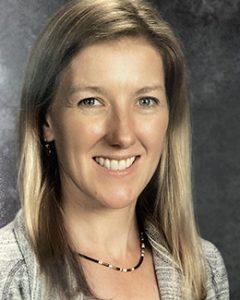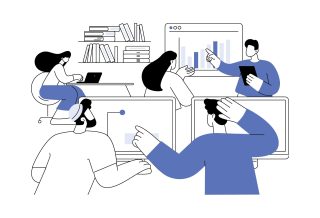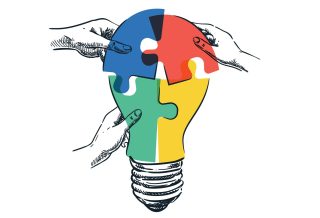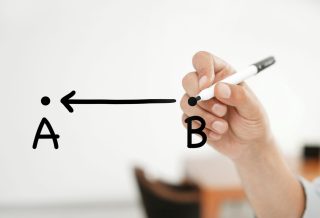IDEAS
Lesson study can build teachers’ confidence in their practice
By Daisy Sharrock and Catherine Challen
Categories: Learning communities, Learning designs, OutcomesOctober 2023
Lesson study — a type of inquiry cycle used by educators seeking to improve instruction and student learning — has long been a mainstay of professional learning and curriculum design in Japan, where students ranked sixth on the most recent OECD’s Programme for International Student Assessment (PISA).
In lesson study, educator teams collaboratively study student thinking, design lessons, observe student learning during a live classroom lesson, and conduct data-driven analysis and reflection on evidence of success. When educators engage in this process together, they build self-efficacy and create a culture of continuous improvement in support of improved instruction.
Familiar with Lesson Study? When educators engage in this process, they build self-efficacy and create a culture of continuous improvement. #teachertwitter #LearningCommunity Share on XThe use of lesson study in the U.S. has been relatively rare. While some teachers do observe other classrooms, this practice is not common and often lacks the sequence of pre- and post-events that uniquely define the process of lesson study (Lewis, 2002). In an exception to this trend, the High Tech High Graduate School of Education has been supporting lesson study through its networks for school improvement for the last six years.
In our networks, lesson study grew out of a desire to explore more student-centered teaching practices that have been shown to increase student understanding and achievement (Boaler, 1997, 2006; Campbell, 1996; Cross et al., 2012; Gutiérrez, 2000; Kisker, et al., 2012; McKenzie et al., 2011). Since 2018, we have involved 85 educators from 25 schools in six public research lesson studies and more than a dozen smaller lesson studies where teachers actively engaged in inquiry cycles to improve pedagogy. Educators in this network were primarily mathematics instructors from a range of public middle and high schools in Southern California.
The results have been positive. For example, 94% of network participants reported that lesson study helped them collaborate more effectively with colleagues to refine instructional practices. In addition, we found that lesson study fosters teacher self-efficacy, the confidence an individual has in their own ability to achieve a particular goal — in this case, confidence in the ability to improve student outcomes. Our experience suggests that lesson study is a worthwhile investment and points to ways other schools and networks can implement it.
Factors contributing to self-efficacy
We explored how participating in lesson study impacts teacher practice and self-efficacy as well as how teachers used data within the context of lesson study to assess student thinking and drive instructional next steps. In this article, we describe the theory and practice of how lesson study promotes self-efficacy, then show the results of a survey in which participating teachers overwhelmingly reported that participating in lesson study through our network supported their practice.
There are four factors that contribute to self-efficacy: mastery experiences, vicarious experiences, social persuasion, and our physiological responses to these experiences (Bandura, 1977). In our experience, lesson study influences all four.
Mastery experiences
Mastery experiences are success experiences — moments when we feel that our actions have led to a desired outcome. Lesson study provides an opportunity for teachers who are being observed to experience a sense of mastery, especially when observers provide them with data that concretely connects their pedagogy with student learning.
Two avenues for doing so are analyzing data from observing focus students and inviting feedback from expert commentators. Analyzing student data is a practice that is highly encouraged but often underdeveloped in a lot of educators. The lesson study structure supports teams to set specific goals and carefully analyze student work to determine if those goals were met.
Our lesson study teams experienced mastery when they could clearly demonstrate that students were making progress toward the identified goals based on their collaboratively designed lessons. One lesson study team, for example, quantified that four out of five students selected as the focus for observation were stating an understanding of the mathematical goal for a lesson at least once, either in small-group conversations or with the whole class. Furthermore, data on student participation showed that every student in that class contributed to the whole-class discussions, a rare occurrence in many high school math classrooms.
Mastery experiences can also result from external experts acknowledging success. Indeed, expert commentary often makes public the micro teacher moves that may not have been obvious to a broad audience and can elevate the professional status of teachers and foster feelings of mastery.
Vicarious experiences
Seeing someone similar to ourselves achieve a goal through sustained effort makes us more likely to believe that we could achieve a similar outcome. When teachers observe other teachers facilitating tasks that elicit student learning and experience an “I can do that” moment, their self-efficacy is heightened.
Teachers in our lesson study teams had a strong desire to see how other teachers were implementing specific practices, how students responded, and how the practices impacted student learning. Then they wanted to talk about it so that they could find out what worked and for whom. Lesson study emerged as an excellent structure for these vicarious experiences.
As teachers watched students in each other’s classrooms during lesson study events, they were more willing to test out practices in their own classroom and teach a lesson in front of their team. Furthermore, as teachers became comfortable with having observers in their classrooms, they began to open up lesson study events to the broader community through public lesson study events. In a public lesson study, colleagues and community members observe a live lesson and learn alongside the lesson study team.
A high school teacher on a lesson study team in our network said, “The thought of conducting a lesson in front of a live audience was initially daunting and something I never thought I could do. After seeing two of my colleagues conduct public lessons, I learned so much from the experience and started to think I could do the same.”
Social persuasion
When others believe that we can achieve our goals, we are more likely to take the first steps to make them happen. Have you ever been reluctant to try something, but then a trusted friend, colleague, or mentor said, “You would be really good at that — you should try it”? Even in the face of immense self-doubt, positive feedback from peers, supervisors, students, and parents can all influence a teacher’s sense of self-efficacy.
Being part of a team lowers the activation barrier for engaging in any activity. As teams work together to explore content and possible lesson structures, they push each other’s thinking, support each other to try new things, and develop comfort in shared risk-taking.
One structure that helps reduce the anxiety of having colleagues in the classroom observing student thinking is the fact that in lesson study, the lesson is designed and owned by the entire team. Regardless of who winds up teaching the lesson, if it goes off the rails, it is a learning experience for the team and not the failure of an individual teacher.
In our networks, we discovered that shifting from telling students what to think to facilitating a student-centered discussion is very challenging, and teachers didn’t always feel successful. But the more teachers observed a colleague conducting a lesson and supported each other to do so, the more teachers were willing to be vulnerable and have colleagues observe student thinking in their classrooms.
By exploring new practices together, teams engaged in positive social persuasion and built their collective efficacy to engage in lesson study practices. A 6th-grade teacher reflected on the need for vulnerability: “It has allowed me to be vulnerable in my practice with colleagues. Through the lesson studies, it allowed for us to really think about our practice as a team (without judgments) to provide richer experiences for our students.”
''When others believe that we can achieve our goals, we are more likely to take the first steps to make them happen.'' #LearningCommunity #Educators #lifelonglearner Share on XPhysiological states
The way we interpret our physiological response to our experiences also influences self-efficacy. If we interpret the anxiety produced from trying something new as debilitating or a sign of future failure, it is more likely that we will shut down and fail to persist. However, if we interpret our anxious feelings as nervous excitement for trying something new, they are less likely to derail our efforts to improve.
Teaching is an inherently vulnerable activity, and anyone who has taught students has felt this on a visceral level. Often a fear of being judged or failing stops us from gathering the critical information that could help us teach well. For example, a fear of hearing that one of our lessons could have been better may prevent us from asking our students for feedback on how a lesson supported their learning. By starting from a learning stance, lesson study acts to lower some of the cognitive and physical anxiety inherent in teaching.
Each lesson study inquiry cycle starts with getting to know your students — as humans with varied interests and strengths and as learners with diverse understandings and skills. Through student empathy interviews and studying student work, teachers create connections with their students and build trust. When we forge connections with our students, it is easier to design lessons that connect to their interests and build on their strengths and learn from our missteps without getting defensive.
Embracing a learning stance and building connections with our students therefore allows us to reframe some of the anxiety of teaching as a natural part of learning together and supports the creation of a positive learning environment for both students and teachers.
One barrier to engaging teachers in lesson study can be fear of judgment and critique. However, teachers in our network felt that lesson study made opening up their practice to others less intimidating. Since the whole team owns the lesson, it promotes collegiality and creates a safe environment to learn together.
In addition, lesson study gives teachers a means of providing context. They can explain what they are trying to do and why. By sharing the research and thought behind a research lesson, teachers bring others into the complex work of teaching and elevate the profession to the status it deserves.
Embracing a learning stance and building connections with our students allows us to reframe the anxiety of teaching as a natural part of learning together. It supports the creation of a positive learning environment for everyone.… Share on XAnalyzing lesson study’s impact
To analyze the impact of lesson study across our network, we conducted semistructured interviews with teachers once a year, teacher surveys three times a year, lesson study observations, and regular analysis of student learning through student work samples.
In survey responses and interviews, educators reported that participating in lesson study supported their implementation of student-centered practices, their collaboration with colleagues, and their use of evidence of student learning to inform instruction.
Fifty-six teachers in the network took a final five-point Likert scale survey in May 2020 and overwhelmingly reported positive impacts of lesson study (see table on below).
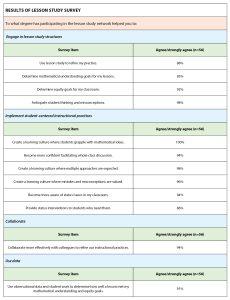
Implementing lesson study
Our experiences with lesson study leading to greater self-efficacy among educators suggest that this method of professional learning is worth investing in. Making a meaningful commitment to lesson study and incorporating it into school culture takes time and intentionality. Our experience points to some action steps and tips for other schools that wish to make this commitment.
To change culture, it helps to change habits. Habits come from routines, and school leaders have an important role to play in establishing school routines. The most successful implementation of lesson study happens when specific and intentional time is carved out for it to happen. It might be within a professional learning community (PLC) or during discipline meetings — any time when teachers are gathering to look at student-level data. What’s important is that the time is protected.
One way to protect the sanctity of lesson study meetings and prevent them from turning into a discussion about daily logistics is to provide initial facilitation to build capacity. Nominate a department head, administrator, or instructional coach to facilitate the first lesson study cycle and invest in professional learning for that person so that they can develop their own self-efficacy first.
Once a team has engaged in the full cycle, rotating facilitation can be an effective way to build collective capacity for engaging in ongoing lesson study cycles. Agendas and other resources for supporting lesson study teams can be found at www.mathagency.org/lesson-study.
Finally, remember to celebrate the learning! It takes courage and passion to teach a lesson in front of colleagues, even a co-designed one. Make sure to celebrate the event with school staff and the community.
Many schools that engage in schoolwide lesson study will conduct public lesson study events where parents and community members are invited to watch the lesson, too. These events feel like public celebrations of learning and build a shared vision of teaching and learning for the whole community. The collective belief in success will drive even more success.
Remember to celebrate the learning! The collective belief in success will drive even more success. #celebrate #inquirycycle #educator Share on XReferences
Bandura, A. (1977). Self-efficacy: Toward a unifying theory of behavioral change. Psychological Review, 84(2), 191-215.
Boaler, J. (1997). When even the winners are losers: Evaluating the experiences of “top set” students. Journal of Curriculum Studies, 29(2), 165-182.
Boaler, J. (2006). How a detracked mathematics approach promoted respect, responsibility, and high achievement. Theory into Practice, 45(1), 40-46.
Campbell, P.F. (1996). Empowering children and teachers in the elementary mathematics classrooms of urban schools. Urban Education, 30(4), 449-75.
Cross, D.I., Hudson, R.A., Adefope, O., Lee, M.Y., Rapacki, L., & Perez, A. (2012). Success made probable: African-American girls’ exploration in statistics through project-based learning. Journal of Urban Mathematics Education, 5(2), 55-86.
Gutiérrez, R. (2000). Advancing African-American urban youth in mathematics: Unpacking the success of one math department. American Journal of Education, 109(1), 63-111.
Hattie, J. (2016). Mindframes and maximizers. Visible Learning Conference, Washington, D.C.
Kisker, E., Lipka, J., Adams, B., Rickard, A., Andrew-Ihrke, D., Yanez, E., & Millard, A. (2012). The potential of a culturally based supplemental math curriculum to reduce the math performance gap between Alaska Native and other students. Journal for Research in Mathematics Education, 43(1), 75-113.
Lewis, C. (2002). Lesson study: A handbook of teacher-led instructional change. Research for Better Schools.
McKenzie, K., Skrla, L., Scheurich, J., Rice, D., & Hawes, D. (2011). Math and science academic success in three large, diverse, urban high schools: A teachers’ story. Journal of Education for Students Placed at Risk, 16(2), 100–21.
Categories: Learning communities, Learning designs, Outcomes
Recent Issues
LEARNING DESIGNS
February 2025
How we learn influences what we learn. This issue shares essential...
BUILDING BRIDGES
December 2024
Students benefit when educators bridge the continuum of professional...
CURRICULUM-BASED PROFESSIONAL LEARNING
October 2024
High-quality curriculum requires skilled educators to put it into...
LEARNING TO PIVOT
August 2024
Sometimes new information and situations call for major change. This issue...



